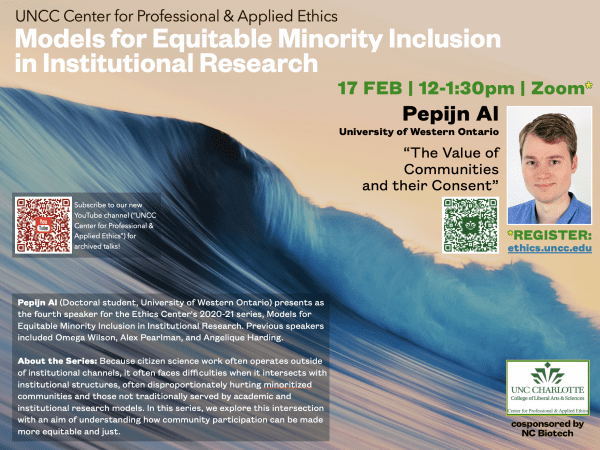PEPIJN AL, “THE VALUE OF COMMUNITIES AND THEIR CONSENT”

Pepijn Al (University of Western Ontario) presents as part of the Ethics Center’s 2020-21 series, Models for Equitable Minority Inclusion in Institutional Research.
Pepijn is a PhD candidate at the University of Western Ontario. His work on the value of community consent appears in a 2020 paper in Bioethics. From the abstract for that article:
“Community engagement is increasingly defended as an ethical requirement for biomedical research. Some forms of community engagement involve asking the consent of community leaders prior to seeking informed consent from community members. Although community consent does not replace individual consent, it could problematically restrict the autonomy of community members by precluding them from research when community leaders withhold their permission. Community consent is therefore at odds with one of the central principles of bioethics: respecting autonomy. This raises the question as to how community consent can be justified or even required. This paper aims to provide an answer to this question by arguing, based on the work of Taylor and Kymlicka, that community practices are important for the identity and autonomy of community members. When these practices are incompatible with a solitary focus on individual informed consent, they need to be protected by making these decision‐making practices (including asking permission to community authorities) part of the consent process. Since these decision‐making practices are important for the autonomy of community members, community consent with the goal of protecting these practices is not necessarily in conflict with autonomy.”
Zoom Registration –> https://uncc.zoom.us/meeting/register/tJ0sdeGprTgpG9MWhJECA7euNlvDNgsylIcu
About the series: Because citizen science work often works outside of institutional channels, it often faces difficulties when it intersects with institutional structures, often disproportionately hurting minoritized communities and those not traditionally served by academic and institutional research models. In this series, we explore this intersection with an aim of understanding how community participation can be made more equitable and just.